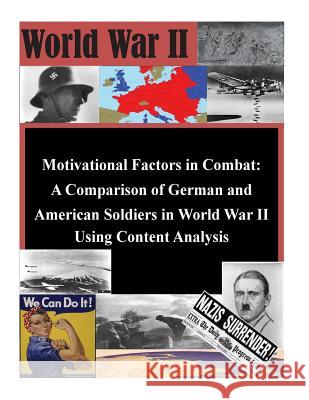Motivational Factors in Combat: A Comparison of German and American Soldiers in » książka
Motivational Factors in Combat: A Comparison of German and American Soldiers in
ISBN-13: 9781500372507 / Angielski / Miękka / 2014 / 138 str.
To determine whether content analysis could be used to successfully identify major combat motivational factors for individuals, this research focused on soldiers who fought in World War II. Combat narratives written by men who fought in World War II were examined. Ten German and ten American works were examined. Of these, five of each were the works of flyers and the other five were the works of ground troops. The following factors were examined: "primary group" influence, ideology, attitudes toward the enemy, group leadership, national leadership, personal gratification, propaganda, religion, vindictiveness, desire to end the war and go home, coercion, and duty/honor/country. References to these motivational factors were tallied, and these results converted into percentages for each group. A qualitative judgment was also made as to the most important factor for each individual. Personal gratification was the primary motivational factor for the American flyers, while duty/honor/country was the most important for the German flyers and American ground troops. The primary factor for the German ground troops was the primary group. The methodology employed successfully identified common combat motivational factors within each group, yet found different factors when contrasting different groups. Further research into this methodology is recommended.
Zawartość książki może nie spełniać oczekiwań – reklamacje nie obejmują treści, która mogła nie być redakcyjnie ani merytorycznie opracowana.











